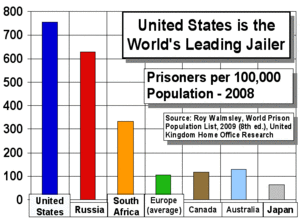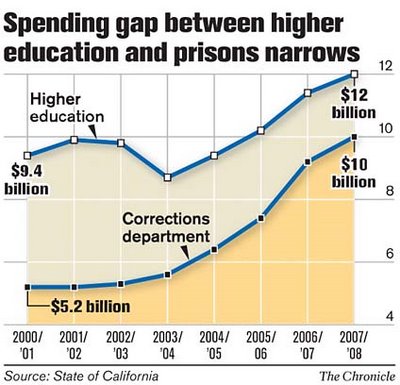Paul Krugman wrote yesterday for the NYTimes, Lobbyists, Guns and Money,
ALEC seems, however, to have a special interest in privatizationSame as private prisons. The only real benefit goes to private prison company executives and shareholders.— that is, on turning the provision of public services, from schools to prisons, over to for-profit corporations. And some of the most prominent beneficiaries of privatization, such as the online education company K12 Inc. and the prison operator Corrections Corporation of America, are, not surprisingly, very much involved with the organization.
What this tells us, in turn, is that ALEC’s claim to stand for limited government and free markets is deeply misleading. To a large extent the organization seeks not limited government but privatized government, in which corporations get their profits from taxpayer dollars, dollars steered their way by friendly politicians. In short, ALEC isn’t so much about promoting free markets as it is about expanding crony capitalism.
And in case you were wondering, no, the kind of privatization ALEC promotes isn’t in the public interest; instead of success stories, what we’re getting is a series of scandals. Private charter schools, for example, appear to deliver a lot of profits but little in the way of educational achievement.
Think about that: we seem to be turning into a country where crony capitalism doesn’t just waste taxpayer money but warps criminal justice, in which growing incarceration reflects not the need to protect law-abiding citizens but the profits corporations can reap from a larger prison population.Martin Luther King Jr. wrote from a Birmingham jail in 1963:
Injustice anywhere is a threat to justice everywhere.And today we have an organized threat to justice everywhere. That threat is called ALEC.
-jsq






 Frequent attendees told me the audience was much larger
than in previous years, and one attributed that to the recent
school consolidation referendum.
Sitting side by side were Chamber Chair Tom Gooding and
FVCS President Sam Allen.
Frequent attendees told me the audience was much larger
than in previous years, and one attributed that to the recent
school consolidation referendum.
Sitting side by side were Chamber Chair Tom Gooding and
FVCS President Sam Allen.
 Jeff Hanson introduced the legislators.
He’s the Chair of the Chamber’s
Jeff Hanson introduced the legislators.
He’s the Chair of the Chamber’s
 “Dr. Z” as Tim Golden called him.
“Dr. Z” as Tim Golden called him.



